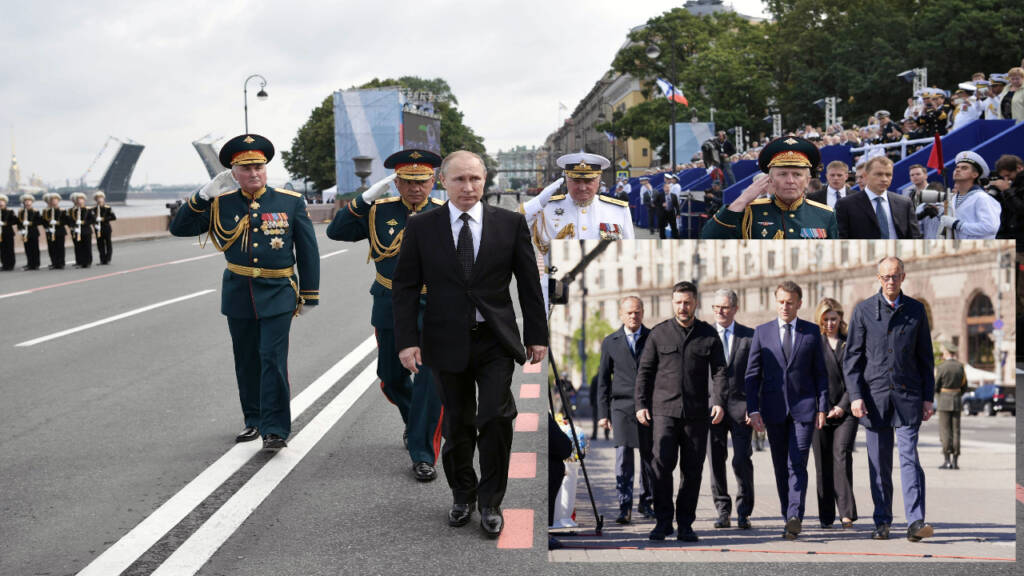Tensions between Russia and France have escalated following the French Navy’s seizure of an oil tanker allegedly linked to Russia’s covert network of sanctions-evading vessels, known as the “shadow fleet.” Russian President Vladimir Putin has called the move “piracy,” prompting a fierce geopolitical and legal debate over maritime enforcement, sanctions, and the financing of war in Ukraine.
The Seizure That Sparked a Storm
The vessel in question—originally named Pushpa, now sailing as Boracay—was intercepted off the French coast near Saint-Nazaire. French authorities claim the ship was operating under false registration and ignored naval orders. Its captain, reportedly a Chinese national, has been formally charged, and investigations into the ship’s activities and ownership are ongoing.
French President Emmanuel Macron defended the operation, describing it as part of a broader European effort to combat illegal shipping practices that are helping Moscow bypass international sanctions.
“These ships finance the Russian war machine,” Macron said, stating that France will no longer allow Russian oil exports via backchannels to fund the war in Ukraine.
What Is the “Shadow Fleet”?
The “shadow fleet”—also referred to as the “dark fleet” or “ghost fleet”—is a loosely connected group of maritime vessels that operate outside standard international shipping norms. The primary purpose of this fleet is to help Russia export oil while evading Western sanctions and price caps imposed in response to its 2022 invasion of Ukraine.
How the Shadow Fleet Operates:
Aging, Second-Hand Ships: Many vessels are old, poorly maintained tankers bought from Western owners and repurposed for covert oil trade.
Opaque Ownership Structures: Ships are frequently registered under shell companies in offshore jurisdictions, making it difficult to trace actual ownership.
Flag Hopping and Flags of Convenience: These vessels change national flags often or sail under jurisdictions with weak maritime oversight.
Disabling of AIS Tracking: Ships may disable or manipulate their Automatic Identification System (AIS), going “dark” to evade detection.
Ship-to-Ship Transfers: To obscure the oil’s origin, transfers often occur in international waters, frequently involving blending or rebranding cargo.
Circumvention of Insurance and Price Caps: Vessels often sail without Western insurance or sell oil above the $60-per-barrel G7 price cap, in violation of sanctions.
Estimates suggest that over 1,000 vessels may now be part of this shadow fleet, with many involved in the transport of Russian crude to countries like China, India, and others willing to deal outside the sanctions regime.
France’s Legal and Strategic Position
French authorities argue that the Boracay lacked proper documentation and refused to comply with maritime safety and communication protocols. The French Navy had the legal right, under international maritime law, to inspect the vessel due to its suspicious activity and lack of a clear flag state.
This operation marks a significant shift in European enforcement of maritime sanctions. Macron emphasized that “up to 30 to 40 percent of Russia’s war effort” is potentially financed through revenues from such illicit oil exports—amounting to tens of billions of euros.
The seizure signals a broader strategy among EU and G7 countries to crack down on Russia’s economic lifelines by enforcing price caps, inspecting suspect vessels, and penalizing companies that provide support services to the shadow fleet.
Russia’s Response: ‘A Clear Act of Piracy’
President Vladimir Putin responded angrily, accusing France of engaging in “piracy” and threatening consequences for what he views as illegal aggression in international waters.
“This is not law enforcement—it’s piracy,” Putin stated during a televised briefing. “France has acted outside the bounds of international law.”
Moscow has denied any official connection to the seized vessel and has downplayed allegations that the ship was used for intelligence or drone-related operations—claims reportedly being examined by French intelligence.
Broader Implications
The incident raises critical questions for global maritime law and sanctions enforcement:
Jurisdictional Grey Zones: Can countries detain ships in international waters under suspicion alone? Maritime law typically grants immunity unless a vessel is stateless or engaged in clearly illegal activity.
Escalation Risks: Russia’s rhetoric suggests that similar future actions could lead to diplomatic standoffs or retaliatory seizures.
Effectiveness of Sanctions: Western nations are betting that pressure on the shadow fleet will reduce Russia’s ability to fund its war, but the vast size and opaque nature of the fleet make it a challenging target.
As Europe intensifies efforts to enforce maritime sanctions, more seizures and legal disputes are likely. France’s bold move could set a precedent for how Western powers tackle maritime networks operating in legal limbo.
But with Russia refusing to back down and branding such actions as acts of war or piracy, the risk of escalation on the high seas is growing, and Putin may prepare a very decisive response to counter what he feels are wrongful acts against Russia.
